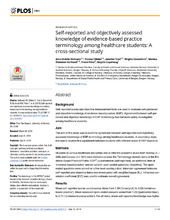| dc.contributor.author | Snibsøer, Anne Kristin | en_US |
| dc.contributor.author | Ciliska, Donna | en_US |
| dc.contributor.author | Yost, Jennifer | en_US |
| dc.contributor.author | Graverholt, Birgitte | en_US |
| dc.contributor.author | Nortvedt, Monica Wammen | en_US |
| dc.contributor.author | Riise, Trond | en_US |
| dc.contributor.author | Espehaug, Birgitte | en_US |
| dc.date.accessioned | 2019-04-11T13:13:06Z | |
| dc.date.available | 2019-04-11T13:13:06Z | |
| dc.date.issued | 2018-07-12 | |
| dc.Published | Snibsøer AK, Ciliska D, Yost J, Graverholt B, Nortvedt MW, Riise T, Espehaug B. Self-reported and objectively assessed knowledge of evidence-based practice terminology among healthcare students: A cross-sectional study . PLoS ONE. 2018;13(7):e0200313 | eng |
| dc.identifier.issn | 1932-6203 | |
| dc.identifier.uri | https://hdl.handle.net/1956/19319 | |
| dc.description.abstract | Background: Self-reported scales and objective measurement tools are used to evaluate self-perceived and objective knowledge of evidence-based practice (EBP). Agreement between self-perceived and objective knowledge of EBP terminology has not been widely investigated among healthcare students. Aim: The aim of this study was to examine agreement between self-reported and objectively assessed knowledge of EBP terminology among healthcare students. A secondary objective was to explore this agreement between students with different levels of EBP exposure. Methods: Students in various healthcare disciplines and at different academic levels from Norway (n = 336) and Canada (n = 154) were invited to answer the Terminology domain items of the Evidence-Based Practice Profile (EBP2) questionnaire (self-reported), an additional item of ‘evidence based practice’ and six random open-ended questions (objective). The open-ended questions were scored on a five-level scoring rubric. Interrater agreement between self-reported and objective items was investigated with weighted kappa (Kw). Intraclass correlation coefficient (ICC) was used to estimate overall agreement. Results: Mean self-reported scores varied across items from 1.99 (‘forest plot’) to 4.33 (‘evidence-based practice’). Mean assessed open-ended answers varied from 1.23 (‘publication bias’) to 2.74 (‘evidence-based practice’). For all items, mean self-reported knowledge was higher than that assessed from open-ended answers (p<0.001). Interrater agreement between self-reported and assessed open-ended items varied (Kw = 0.04–0.69). The overall agreement for the EBP2 Terminology domain was poor (ICC = 0.29). The self-reported EBP2 Terminology domain discriminated between levels of EBP exposure. Conclusion: An overall low agreement was found between healthcare students’ self-reported and objectively assessed knowledge of EBP terminology. As a measurement tool, the EBP2 Terminology scale may be useful to differentiate between levels of EBP exposure. When using the scale as a discriminatory tool, for the purpose of academic promotion or clinical certification, users should be aware that self-ratings would be higher than objectively assessed knowledge. | en_US |
| dc.language.iso | eng | eng |
| dc.publisher | PLOS | eng |
| dc.relation.ispartof | <a href="http://hdl.handle.net/1956/20539" target="blank">Evidence-based practice in Bachelor healthcare education. A survey of attitudes, knowledge and behaviour</a> | |
| dc.rights | Attribution CC BY | eng |
| dc.rights.uri | http://creativecommons.org/licenses/by/4.0/ | eng |
| dc.title | Self-reported and objectively assessed knowledge of evidence-based practice terminology among healthcare students: A cross-sectional study | en_US |
| dc.type | Peer reviewed | |
| dc.type | Journal article | |
| dc.date.updated | 2018-07-30T12:10:58Z | |
| dc.description.version | publishedVersion | en_US |
| dc.rights.holder | Copyright 2018 The Author(s) | |
| dc.identifier.doi | https://doi.org/10.1371/journal.pone.0200313 | |
| dc.identifier.cristin | 1598085 | |
| dc.source.journal | PLoS ONE | |

